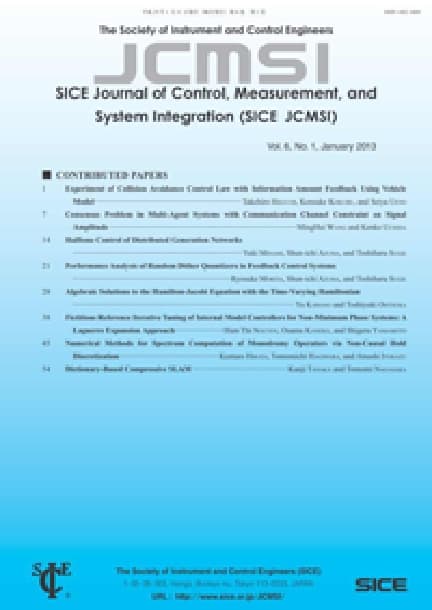- トップ
- SICE Journal of Control, Measurement, and System Integration
- Vol. 10 (2017), No. 1
SICE Journal of Control, Measurement, and System Integration Vol. 10 (2017), No. 1
Backnumber
-
Vol. 13 (2020)
-
Vol. 12 (2019)
-
Vol. 11 (2018)
-
Vol. 10 (2017)
-
Vol. 9 (2016)
-
Vol. 8 (2015)
-
Vol. 7 (2014)
-
Vol. 6 (2013)
-
Vol. 5 (2012)
-
Vol. 4 (2011)
-
Vol. 3 (2010)
-
Vol. 2 (2009)
-
Vol. 1 (2008)
SICE Journal of Control, Measurement, and System Integration Vol. 10 (2017), No. 1
Bilateral Control of Flexible Master-Slave Arms with Time-Varying Delay Affected by Contact Force from Obstacle
Masaharu YAGI, Yuichi SAWADA
pp. 2-9
DOI:
10.9746/jcmsi.10.2抄録
A bilateral control system for flexible master-slave arms with time-varying delay affected by contact force from an obstacle is considered in this study. The proposed bilateral control system is constructed using a rigid master arm, a flexible slave arm actuated by a high-geared servomotor, and a communication network that causes the time-varying delay. The flexible slave arm is affected by contact force from the obstacle during motion. PD and PDS controllers are designed for controlling the rigid master and flexible slave arms, respectively. A Lyapunov function is used in order to prove the stability and passivity of the proposed system. Finally, performance of the proposed bilateral control system is verified by numerical simulations.
Development of High-Performance Compact On-Board Computer for Micro/Nano-Satellites with Software Resource Sharing Framework
Tomohiro NARUMI, Shinji TAKANO, Shinichi KIMURA
pp. 10-15
DOI:
10.9746/jcmsi.10.10抄録
Due to advances in mission complexity and increased requirements for autonomous control of small satellites, high-level computing performance of on-board computers, as well as the necessary software implementation to maintain essential functionality, is more frequently required for small satellites. To satisfy these requirements, we developed a high-performance and compact on-board computer for micro and nano-satellites using commercial off-the-shelf (COTS) components including a structure to increase the reliability by sharing software to enhance reusability. The capability of small satellites can be dramatically improved by having common standards for high computing performance and a low-cost platform for the on-board computers. Additionally, the mission potential of small satellites can then be expanded. When the same platform is utilized recursively, the reliability of the platform will increase through repeated verification. In this paper, we describe the concept of a high-performance, low-cost on-board computer system using COTS devices, the sharing of software resources, and a practical on-orbit evaluation of the system.
Inverse Optimal and Asymptotically Stable Adaptive Consensus Control of Multi-Agent Systems Based on H∞ Control Criterion
Yoshihiko MIYASATO
pp. 16-24
DOI:
10.9746/jcmsi.10.16抄録
Design methods of asymptotically stable adaptive consensus control of multi-agent systems composed of the first-order and the second-order regression models are presented based on inverse optimal control criterion. The proposed control schemes are derived as solutions of certain H∞ control problems, where estimation errors of tuning parameters are regarded as external disturbances to the process. The resulting control systems are robust to uncertain system parameters and the desirable consensus tracking is achieved asymptotically via adaptation schemes and L2-gain design parameters together with an introduction of a generating model of a leader.
Application of Adaptive Sliding Mode Control with an Ellipsoidal Sliding Surface for Vehicle Distance Control
Taichi MIZOSHIRI, Yasuchika MORI
pp. 25-31
DOI:
10.9746/jcmsi.10.25抄録
This paper proposes a sliding mode control with an ellipsoidal sliding surface for vehicle distance control. The performance of two different sliding surfaces, namely ones that are ellipsoidal and linear, is evaluated under the same conditions. Each controller, regardless of sliding surface, is designed to achieve a similar level of control performance. It is shown through simulation that the sliding mode control with the ellipsoidal sliding surface proposed by the authors has advantages over conventional sliding mode control with a linear sliding surface, in that it is smoother and has lower energy consumption. Furthermore, a boundary layer width adaptation law is applied to prevent chattering.
Derivation of Robust Stability Ranges for Disconnected Region with Multiple Parameters
Tadasuke MATSUDA
pp. 32-38
DOI:
10.9746/jcmsi.10.32抄録
The aim of this paper is to give an extension of the paper [T. Matsuda et al. Proc. 33rd IASTED Modelling, Identification and Control, 809-004, 2014], which gives a robust stability condition for a system with disconnected stability regions. The considered system depends on only one uncertain parameter. In this paper, an explicit algorithm to derive the stability ranges for disconnected stability regions is given. We also extend the result to the case that the system depends on multiple uncertain parameters. A numerical example shows that the proposed method can be applied to robust stability analysis of the lateral dynamics of an aircraft even if all the coefficients of the characteristic polynomial vary. The numerical example also shows that the stability ranges derived by the proposed method are larger than those by a former method.
論文アクセスランキング
02 Feb. (Last 30 Days)
-
Perspectives on the Promising Pathways to Zero Carbon Emissions in the Steel Industry toward 2050
ISIJ International Vol.65(2025), No.2
-
大気腐食環境下における1700 MPa級調質ボルトの遅れ破壊機構
鉄と鋼 Vol.112(2026), No.2
-
連続鋳造鋳型内溶鋼流動最適化のための新電磁流動制御
鉄と鋼 Vol.112(2026), No.1
-
Preface to the Special Issue on "Effects of Cu and Other Tramp Elements on Steel Properties"
ISIJ International Vol.37(1997), No.3
-
Effect of B on Surface Oxidation Behavior and Phosphatability of Si–Mn-added Cold-Rolled Steel Sheets
ISIJ International Vol.66(2026), No.1
-
Morphology Control of Metallic Iron Formed by Hydrogen Reduction of Iron Oxide
ISIJ International 早期公開
-
-
-
Connecting the Dots
材料と環境 Vol.74(2025), No.11
-
表層軟質クラッド鋼板を実適用した液体アンモニアタンクの30年間の耐SCC性
材料と環境 Vol.74(2025), No.11
この機能はログイン後に利用できます。
下のボタンをクリックしてください。









